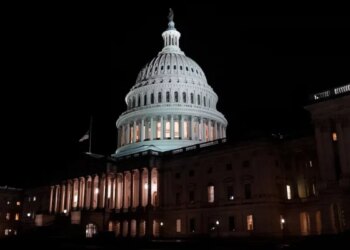Select Language:
Trump’s Legislative Struggles Continue as House Republicans Face Divisions
US President Donald Trump speaks during a visit to a temporary migrant detention center, informally known as “Alligator Alcatraz,” in Ochopee, Florida, on July 1, 2025. — Reuters
- Latest vote stalls as Republican defectors oppose Trump’s bill.
- Bill could add $3.4 trillion to national debt over the next decade.
- Republicans are targeting Trump’s July 4 deadline.
On Wednesday, House Republicans made some progress toward advancing President Donald Trump’s sweeping tax reduction and spending proposal, having briefly seemed to address concerns over its high costs voiced by some party hardliners. However, the initiative faced more delays shortly thereafter.
During a series of closed-door meetings, lawmakers extended a procedural vote for over seven hours, allowing Trump and House Speaker Mike Johnson an opportunity to sway dissenting members into supporting the president’s key legislation. Ultimately, a procedural measure passed with a narrow 220-212 vote, reflecting party lines but not guaranteeing that skeptics were convinced.
Following this, voting commenced on another preliminary measure required to bring the bill to the main vote, but Republicans fell short as five members from their party voted against Trump—a bloc large enough to sink the proposal. These dissenters could still shift their votes.
Frustration boiled over for Trump as the late-night deadline approached on Capitol Hill, preventing the legislation he promotes as “One Big Beautiful Bill” from passing procedural requirements. In a post on his Truth Social platform, he expressed disdain: “Largest Tax Cuts in History and a Booming Economy vs. Biggest Tax Increase in History, and a Failed Economy. What are the Republicans waiting for??? MAGA IS NOT HAPPY, AND IT’S COSTING YOU VOTES.”
A faction of fiscally conservative lawmakers, known for opposing deficit spending, joined all House Democrats in voting against the bill due to their objections over social spending cuts.
Despite the setbacks, optimism appeared to linger among Republicans earlier that evening. House Majority Whip Tom Emmer remarked to Reuters that progress was being made. “There’s going to be a vote tonight, we’ll complete the voting on the rule, then debate the bill,” he insisted.
Meanwhile, Trump expressed hopeful sentiments as well, asserting on social media that “the Republican House Majority is UNITED.”
The Senate passed the proposed legislation with only a slim margin after intense discourse regarding its significant financial implications, which nonpartisan analysts predict will swell the national debt by $3.4 trillion over the next decade, largely due to proposed cuts to Medicaid for low-income Americans.
Given a slender 220-212 majority, Johnson cannot afford more than three defections from his ranks. Earlier in the day, some skeptics indicated there were enough votes to block the proposal. “He knows I’m a ‘no.’ He knows I don’t believe there are the votes to pass this rule as it stands,” stated Republican Representative Andy Harris from Maryland, a member of the hardline Freedom Caucus.
July 4 Deadline
Trump is pressing legislators to have the bill ready for him to sign into law by the July 4 Independence Day holiday and has met with some dissenters at the White House.
Democrats stand united against the proposal, arguing that its tax breaks disproportionately favor the wealthy while diminishing essential services for lower- and middle-income families. The nonpartisan Congressional Budget Office anticipates that nearly 12 million individuals could lose their health insurance due to the bill.
“This bill is catastrophic. It is not policy; it is punishment,” asserted Democratic Representative Jim McGovern during floor debates.
While Republicans in Congress have grappled with unity challenges in recent years, they have largely refrained from opposing Trump since his return to the White House in January.
If the House modifies the legislation, it would necessitate another Senate vote, making it nearly impossible to meet the upcoming July 4 deadline.
The bill encompasses many of Trump’s top domestic objectives, including tax cuts and stricter immigration enforcement. It plans to extend Trump’s 2017 tax reforms, slash health and safety net programs, fund immigration enforcement initiatives, and eliminate numerous green energy incentives. Additionally, it features a proposed $5 trillion increase in the national debt ceiling, an issue Congress must address soon to avoid default.
The cuts to Medicaid have also raised alarms among some Republicans, prompting extra funding considerations for rural hospitals.







